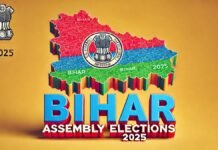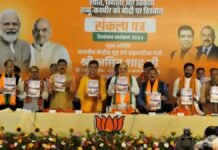
Srinagar: In a recent statement, Chief Election Commissioner Rajiv Kumar emphasized the Election Commission of India’s (ECI) commitment to transparency, particularly in the monitoring of online transactions through wallets during elections in Jammu and Kashmir. Kumar highlighted the ECI’s adherence to the principles of full disclosure, in line with the Supreme Court’s directive to submit details regarding electoral bonds.
Kumar also addressed the ECI’s preparation for the numerous elections scheduled for 2024, including assembly elections. He noted that discussions with various political parties, law enforcement agencies, and police officers in Jammu and Kashmir have underscored the universal desire for fair elections and the prompt appointment of public representatives.
Amidst concerns raised by local parties about unequal security cover and alleged administrative discrimination during the District Development Council (DDC) elections, Kumar assured that the ECI is considering the demands for equitable voting arrangements, including for migrant voters. He also mentioned the proposal for conducting elections for each parliamentary constituency in a single phase to ensure fairness.

Detailing the demographics of Jammu and Kashmir’s electorate, Kumar revealed that there are 5 Lok Sabha seats with a total of 86.9 lakh voters, comprising 44 lakh male and 42 lakh female voters, along with 67,400 disabled persons and 2,886 centenarian voters. The region will see 3.4 lakh first-time voters, and the sex ratio has improved from 945 to 954 since 2019. Notably, the female voter ratio exceeds 1000 in 16 assembly constituencies.
With 11,629 polling stations across the region, the ECI plans to webcast 52% of these stations and have 93 managed solely by manpower. Additionally, the ‘Vote from Home’ option will be available for elderly voters, and a 100-minute window will be allocated for processing and responding to complaints, ensuring an inclusive and responsive electoral process.



















































